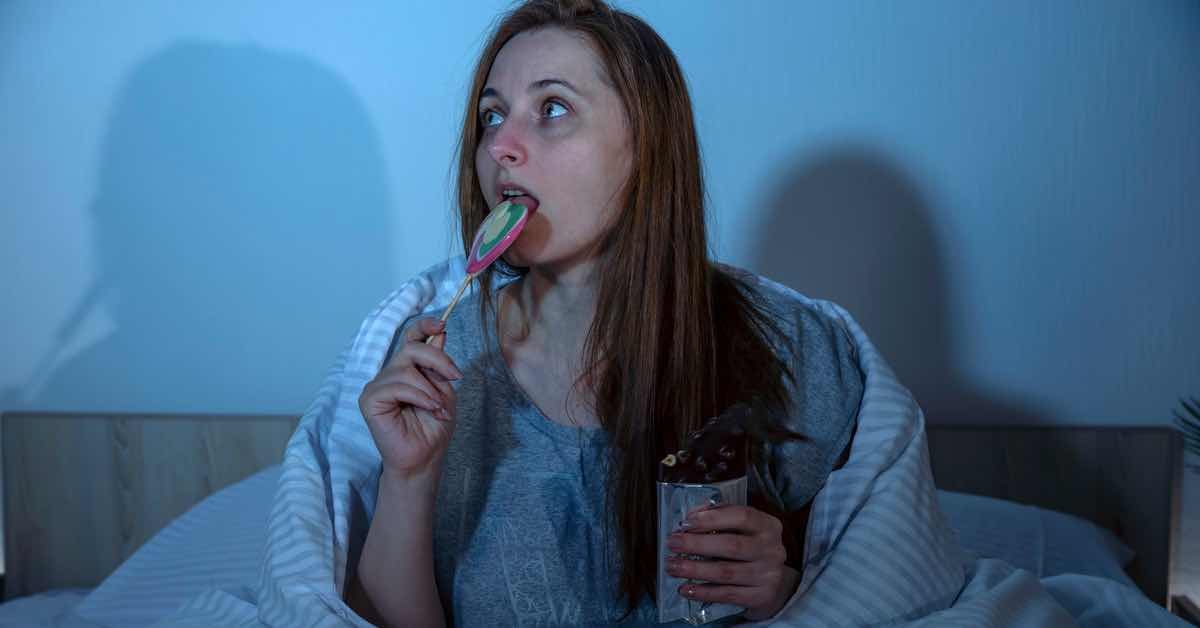
Can't figure out why you're having trouble sleeping while at the end of the day, we're supposed to shut down? Perhaps you're eating meals before bed that keep you up.
After dinner, many people indulge in dessert. Chasing down a savory dinner with something sweet has a certain satisfaction. But eating sugar before bed might be the reason for the disrupted quality of sleep. Research claims that cutting back on sugar before bed rewards you with a fantastic night of restful sleep!
Your impulse to eat sugary snacks before bed might also be fueled by learned behaviours. Read on to pique your interest in knowing how sugar before bed affects your sleep.
Is it ok to have sugar before bed?
You may tell that food has a significant impact on your ability to sleep if you've ever eaten a big batch of food before bed and felt unrested the next morning.
While there are many other diet foods that are interfering with your sleep, Sugar is the highly quoted one. Despite its many advantages, sugar is difficult to avoid. People deal with a serious sweet tooth, so we all really relate to this. But don't cookies, chocolate, and ice cream beckon to us?
Sugar consumption raises the chance of developing diabetes, tooth decay, and obesity. However, it also has another significant impact, interfering with your sleep in a way that makes you need more sweets because of your lack of sleep.
Eating sugar before bed is known to disrupt the sleep cycle, in addition to a variety of medical illnesses and environmental factors that can also keep you awake at night. One easy method to significantly improve your overall health is by practising better sleep hygiene. If doing so means forgoing your customary dessert, it will be worth it if it means you will get a better night's sleep.
Your diet may be a good place to start if you're having trouble falling asleep. Let’s take a quick look at certain foods that you need to avoid before bed.
Foods to avoid eating before bed
To ensure a restful night's sleep, avoid the following foods and beverages:
- Caffeinated goodies - Caffeinated items such as soda, coffee, caffeinated tea, and chocolate may harm your sleep and keep you up at night.
- Spicy foods - Spicy foods are believed to increase the symptoms of acid reflux and heartburn as well as indigestion. John Hopkins Medicine advises avoiding spicy foods three hours or more before bedtime.
- Junk food - Fast food, instant noodles, and sweeteners are all linked to shorter sleep duration and poorer sleep quality. These foods tend to be higher in refined carbs, added sugar, saturated and trans fats.
- Fat-rich items - Eating foods high in fat, like fried chicken and fatty meats, may contribute to poor sleep.
- High Glycemic Index foods - High glycemic diets trigger inflammatory responses in the body and create imbalances in beneficial intestinal bacteria, which may also affect sleep.
5 ways that depict sugar wrecks sleep cycle
Does sugar keep you awake? To answer this, let’s have a look at how eating sugar before bed affects our sleeping rhythm. Here are the five well-researched ways that depict sugar affects circadian rhythm. (Breus)
- Sugar impairs sleep efficiency
- Sugar stimulates hunger
- Sugar causes inflammation
- Sugar hurts gut health
- Sugar affects dental strength
- Sugar impairs sleep efficiency:
Late-night sugar overstimulates you. According to Dietician Alex Evans, when you consume sugar before bed, your blood sugar levels rise and your pancreas releases insulin, which aids in reabsorbing the sugar and providing the cells with energy. But that's not what we're aiming to do at night; instead, it provides you with energy and gets you ready for activities.
We invite you to explore the insights we've gathered on the sleep cycle. To access our comprehensive blog post, simply click on this link. Your journey to better understanding starts here.
Eating sugar before bed can keep you up and lead to insomnia because it can lead to hypoglycemia, which has been proven in studies to disrupt sleep by causing the production of stress chemicals like adrenaline and cortisol, which make you more energised and restless.
“Sugar uses up a lot of magnesium, which you need for sleep,” says the nutritional therapist, Charlotte Watts. - Sugar stimulates hunger:
Insulin, a hormone important in controlling blood sugar, is similarly affected by insufficient sleep. Regular sugar consumption can start a hard-to-break cycle of sleep disruption and excessive hunger that over time causes obesity and diabetes.
- Sugar causes inflammation:
Sugar-rich diets exacerbate chronic inflammation. Gut flora, which is now understood to be a major regulator of overall health, are altered negatively and more prone to inflammation when sugar and refined carbohydrates are consumed in large quantities. Additionally, sugar raises cholesterol, which is associated with inflammation.
- Sugar hurts gut health:
A diet high in processed carbohydrates and fats alters the gut microbiota's makeup in an unhealthy way. Sugar is such a potent trigger. Studies reveal that just the mere sight of a sugary treat is enough to activate the brain's reward system.
- Sugar affects dental strength:
Consuming sugar feeds destructive bacteria like streptococcus, which eats away our teeth's enamel. Sugar alters the mouth's natural pH, promoting the growth of microorganisms.
Sugar causes gum illnesses like gingivitis by luring dangerous germs to the gums and destroying the tissues that hold our teeth in place.
According to Watts, "There is a real biochemical drive to eat more sugar." The body understands that you need a crutch since your resources are limited. According to her, "We often gravitate to items that might support us when we don't feel sufficiently joyous in life, and sugar is one of those”. Sugar is a powerful kind of self-medication.
To combat varying blood sugar levels, Watts advises eating properly throughout the day, beginning with a lot of protein for breakfast. "You are more able to go into healthy sleep patterns at night," she advises. "The less you rely on sugar and caffeine to prop you up through the day, the less you are able to go into unhealthy sleep patterns during the night."
Does sugar cause nightmares?
While sugar doesn't directly cause nightmares, it can negatively impact your sleep quality, which can lead to more vivid dreams, including nightmares. Eating sugary foods and drinks before bed can cause a spike in blood sugar levels, which can make it harder to fall asleep and stay asleep.
Additionally, consuming sugar can lead to weight gain and increase the risk of developing diabetes, which can also negatively impact your sleep quality. It's best to avoid sugary foods and drinks before bed and opt for healthier options instead to ensure a good night's sleep.
Nutrition and good sleep are indisputable links
Start by taking a closer look at your nutrition if you're having trouble putting your brain to bed and becoming comfortable for a restful night's sleep. You might be shocked to learn that just a few minor adjustments will help you rest longer.
You'll increase your chances of eating properly and sleeping better if you start keeping track of meals that interfere with sleep and understand the relationship between sleep and nutrition.
What is the ideal sugar intake?
Guidelines from the UK's National Health Service (NHS) provide a clear roadmap for managing your sugar intake. The guidelines are as follows:
- Adults: The recommended limit for adults is no more than 30g of free sugars a day, roughly equivalent to 7 sugar cubes.
- Children (7 to 10 years old): For children in this age group, the limit is lower, with no more than 24g of free sugars a day, or about 6 sugar cubes.
- Children (4 to 6 years old): Younger children should have no more than 19g of free sugars a day, approximately equal to 5 sugar cubes.
For a real-world perspective, consider that a 12-ounce can of soda contains approximately 32g of sugar - exceeding the recommended daily limit for children and coming very close to the limit for adults.
Understanding these guidelines can help you make informed choices about the foods and beverages you consume. Reading the nutritional information on food labels should become a regular part of your grocery shopping routine.
In addition, remember that maintaining good sleep hygiene is essential. Numerous studies indicate that poor or insufficient sleep can interfere with the proper synthesis and function of hormones that regulate hunger, such as leptin and ghrelin.
5 strategies to prevent sugar from crushing your sleep
Even while it can seem natural to grab a sweet boost in the evening when you're fatigued, doing so could disrupt your sleep. What can you do to avoid eating sugar before bed and breaking the habit? Perhaps dietary know-how is the key here.
Some dietary recommendations for sound sleep include:
- Consume foods that release sugar gradually:
Foods with a low glycemic index (The glycemic index (GI) assesses how much a particular food can raise blood sugar levels) like fruits, vegetables, whole grains, and pulses helps you with midnight hypoglycemia and cravings, and hence prevent sleep disturbances. - Increase your water intake:
Enough water consumption prevents dehydration, eliminates sugar from the body, and curbs midnight cravings. - Eat Foods That Are Tryptophan-Rich:
Tryptophan-rich foods, such as milk, cereals, eggs, poultry, beans, lentils, almonds, whole grains, prawns, white meat, and sweet potatoes, are thought of as natural sleep aids and should be recommended for those who suffer from insomnia.
According to Evans, tryptophan contributes to the production of serotonin, also referred to as the "happy hormone." Among its effects is helping you get ready for bed. - Skip the fat-rich foods:
Obstructive sleep apnea and snoring are brought on by eating a diet high in lipids, which makes you gain weight and makes it difficult to sleep.
Heartburn and reflux issues, which can also have a detrimental impact on your sleep, are also more likely to occur with a high-fat diet.
Fat-rich foods include, for instance, dark chocolate, cheese, fish, butter, cream, olive oil, avocados, etc. - Avoid eating sugar before bed:
Too much sugar in the evening can be unhealthy for our health. Also, watch your servings. Because a full stomach can make it difficult to fall asleep.
A study done by Sarah A. Alahmary in 2019 concluded that Heart disease, diabetes, and cancer risk factors like obesity, high blood pressure, insulin resistance, and inflammation are all increased by consuming large amounts of added sugar.
Making wiser eating decisions throughout the day might also be aided by getting enough sleep at night. According to research, people who get enough sleep try to eat better and make wise eating decisions.
Dr. Michael Breus, A Clinical Psychologist, states the advantage of rebooting diets leading to a big boost in sleep.
You can maintain the health of your gut by eating a low-sugar, high-fibre diet that prioritises whole, unprocessed foods. You'll also get better sleep as a result.
Conclusion
Sugar-rich meals can interfere with your sleep in more ways than one. Regardless of when you eat them, a dietary pattern that includes a lot of fast food and sweet snacks can cause insomnia and poor sleep quality.
Your health and sleep can benefit greatly from cutting back on added sugars in your diet, even just a little bit. Self-care is more than just a buzzword. Taking care of our physical and mental health can stimulate improvement in other areas of life as well, such as sleep.
So, when are you starting your version of eating clean? Shape-up, eat the right plans.


.png?width=512&name=united-kingdom%20(1).png)
